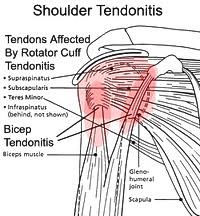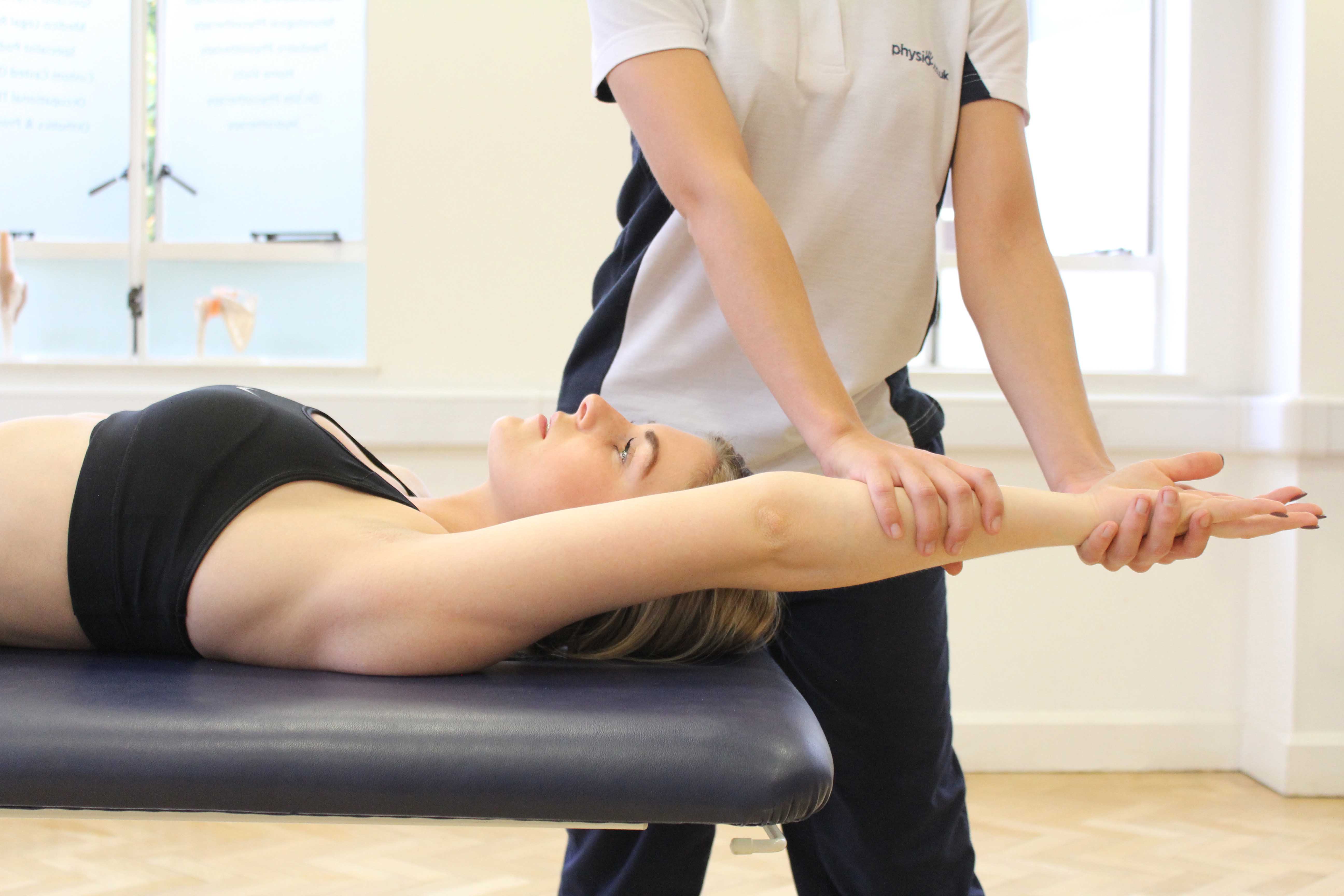|
BOOK NOW |
ASK ABOUT YOUR PAIN |
Home > Blog > Physiotherapy > Conditions > Shoulder Pain > Rotator Cuff Tendinitis Physiotherapy
Rotator Cuff Tendinitis Physiotherapy

Disorders of the rotator cuff and the tissues around it are the most common causes of shoulder pain in people over 40 years of age. Rotator cuff tendinopathy occurs when a shoulder tendon (a bundle of fibers connecting muscle to bone) is irritated and becomes sore.
If left undiagnosed and untreated...with continued irritation, the tendon can begin to break down, causing tendinosis—a more chronic condition.
People who perform repetitive or overhead arm movements, such as
- weight lifters
- athletes
- and manual laborers
are most at risk for developing rotator cuff tendinopathy. Unfortunately, poor posture can also contribute to its development.
Our senior physiotherapists can help you
identify and correct risk factors for rotator cuff tendinopathy, and
help you decrease your pain while improving your shoulder motion and
strength.
first of all, What is Rotator Cuff Tendinitis?

Our rotator cuff muscles are a group of 4 muscles that attach the humerus (upper arm bone) to the scapula (shoulder blade).
The rotator cuff muscles functions to
- raise
- rotate
- and stabilize the upper arm
A tendon is a bundle of fibers that connects the muscles to the bone.
Rotator cuff tendinitis happens when the tendon connected to the rotator cuff muscles becomes inflamed and irritated.
This condition can be caused by:
- Repetitive arm movements, such as those performed by a hair stylist or house painter
- Overhead shoulder motions, such as those performed by baseball pitchers or swimmers
- Weakness and muscle imbalances in the shoulder blades and shoulder muscles
- Tight muscles and tissues around the shoulder joint
- Bony abnormalities of the shoulder region that cause the tendons to become pinched
- Poor posture, such as rounded shoulders caused by leaning over a computer for long periods (shoulder impingement syndrome)
what does Rotator
cuff tendinitis feel like?
Rotator cuff tendinopathy is characterized by shoulder pain that can happen slowly and gradually over time or come on very suddenly. The pain occurs in the shoulder region and sometimes radiates into the upper arm. It does not usually radiate past the elbow region, although it can.
You may be symptom free at rest or experience a mild, dull ache; however, pain can be moderate to severe with certain shoulder movements and can be easily provoked. Often, just reaching behind the body to perform a motion, as in fastening a seat belt, can be very painful.
So can overhead activities, such as
- throwing
- swimming
- reaching into a cupboard
- or combing your hair
The pain can worsen at night, especially when rolling over or attempting to sleep on the painful side. You may notice weakness when lifting and reaching for household items. Holding a heavy platter or taking a pan off the stove may become difficult.
If the condition is left untreated,
it is possible to begin to experience pain in other areas, such as the
neck pain.
How Is It Diagnosed?
Our senior physiotherapists will perform an evaluation and ask you questions about the pain and other symptoms you are feeling. We may perform
- strength and motion tests on your shoulder
- ask about your job duties and hobbies
- evaluate your posture
- and check for any muscle imbalances and weakness that can occur between the shoulder and the scapular muscles
We will gently touch your shoulder in specific areas to determine which tendon or tendons are inflamed, and may perform other special tests to detect rotator cuff tendinopathy. Generally, a physical examination is all that is needed to diagnose rotator cuff tendinopathy.
If the symptoms do not resolve with shoulder physical therapy, imaging (eg, MRI) may be considered, to help determine any possible underlying condition that could be affecting the shoulder.
how our senior physiotherapists can help with rotator cuff tendinitis

It is important to get proper treatment for shoulder and rotator cuff tendinitis as soon as it occurs.
Over time, a degenerated tendon that is not treated can begin to tear, causing a more serious condition. Shoulder physical therapy can be very successful in treating
- rotator cuff tendinitis
- rotator cuff tendinosis
- shoulder impingement syndrome
You will work with our senior physical therapists to devise a treatment plan that is specific to your condition and goals.
Your individual physiotherapy treatment program may include:
Pain management
We will help you identify and avoid painful movements to allow the inflamed tendon to heal. Cold therapy, massage, heat therapy or moist heat may be applied for pain management.
Therapeutic modalities, such as iontophoresis (medication delivered through an electrically-charged patch) and electrical stimulation (TENS) may be applied.
Patient education
Posture education is an important part of shoulder physiotherapy.
For example, when your shoulders roll forward as you lean over a computer, the tendons in the front of the shoulder can become pinched. We may suggest adjustments to your workstation and work habits.
Wewill also instruct you in ideal sitting, standing, and sleeping positions to help alleviate symptoms. We may suggest different ways to perform currently painful activities and show you movements to avoid while the shoulder is painful.
Manual therapy
We may use manual therapy techniques, such as gentle joint movements, soft-tissue massage, and shoulder stretches, to get your shoulder moving again in harmony with your shoulder blade.
Range-of-motion exercises
You will learn exercises and stretches to help your shoulder and shoulder blade move properly, so you can return to reaching and lifting without pain.
Strengthening exercises.
We will determine which strengthening exercises are right for you, depending on your specific condition. You may use weights, medicine balls, resistance bands, and other types of resistance training to challenge your weaker muscles.
You will receive a home-exercise program, so you can continue rotator-cuff and shoulder-blade strengthening long after you have completed your formal physical therapy.
Functional training
As your symptoms improve, we will help you return to your previous level of function, which may include household chores, job duties, and sports- related activities.
Functional training can include working on lifting a glass into a cupboard or throwing a ball using proper shoulder mechanics. You and our senior physical therapists will decide what your goals are, and get you back to your prior level of functioning as soon as possible.